Sherlock. John. Mary. You guys.
Can we all hug now? It’s hug time. At least, once I’ve caught my breath.
Spoilers for “His Last Vow.”
What… what do I do with all this emotion, I don’t even…. (Cry mostly? Laugh hysterically? Shriek until my neighbors call the cops with complaints of a loose baby owl?)
So John hasn’t seen Sherlock in a month and is itching for a chance to do something useful and a bit unsafe. Up pops a neighbor whose son is doing lots of drugs, and John decides to be all heroic and nab him from a drug den. After being an incredible badass, he finds the kid and whoops—there you are Sherlock! The Watsons take him for drug test, which he fails spetacularly. But everything’s okay; it’s for a case.
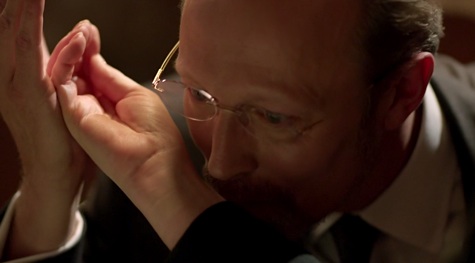
Well, everything’s not okay because the guy Sherlock is planning to go up against is Charles Augustus Magnusson, master blackmailer and head of a very prominent media empire. The guy crossed the wrong woman, and she came to Sherlock for help after Magnusson threatened to destroy her husband’s name and licked her face to taste her perfume. Ew. I’m trying to think of an even quicker way to make someone instantly repulsive to an audience, but I’m pretty sure that’s about as good as it gets. Sherlock explains that he’s getting high again to make it look like he is off his game, to give Magnusson a “pressure point” that he thinks he can manipulate him by.
John would care about that, but he’s too busy being mesmerized by the fact that Sherlock has a girlfriend—Janine! From the wedding! Guess that guy she hooked up with after the reception didn’t pan out. They seem to be having lots of sex and are planning to have dinner with John and Mary, which John cannot wrap his head around. This is the face he makes when they start kissing in front of him:
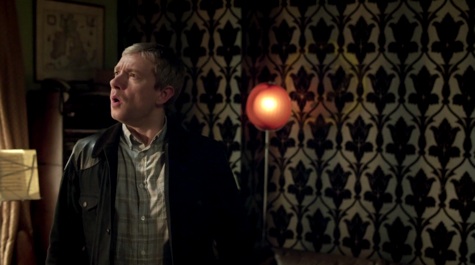
Poor John. So Sherlock meets Magnusson, who proceeds to make a big show of dominance by peeing in the Baker Street fireplace. He just keeps getting grosser, I don’t know what to do. He tells Sherlock that he’s not going to give him the letters that his client wants and strolls out. Sherlock wants to get more intel, so he drags John to Magnusson’s place of work with the intent of breaking into his private office. In order to do that, he proposes to Janine, who turns out to be Magnusson’s PA. Janine is out cold when they get there, and while John is tending to her, Sherlock walks in to find Magnusson at the wrong end of a silenced hand gun.
Mary is the one about to pull the trigger.
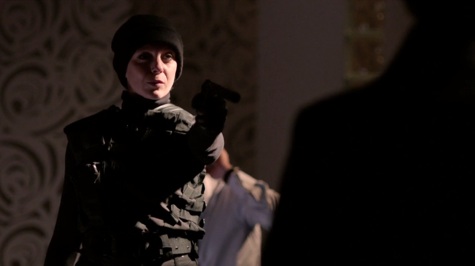
She’s in full black ops gear, and shoots Sherlock in the chest, leaving Magnusson alive. The detective manages to pull through using some impressive Mind Palace-ing and at first Sherlock keeps Mary’s secret. But John’s brighter than he looks and he and Sherlock arrange to catch Mary in her lie together; her name is one that she took from someone long dead to start a new life after being an assassin. John is (understandably) furious. Sherlock tries to calm his friend, intent on protecting Mary regardless of the whole shooting… thing. John lets Mary plead her case, but takes some time coming around. Come Christmas, John apologizes to his wife, and tells her that he doesn’t need to know who she was before—he wants to spend his future with her. Hooray! Watsons! Trust! Incoming babies!
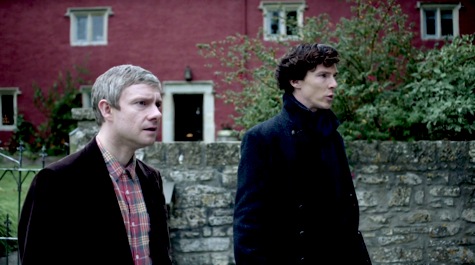
Sherlock drugs the whole family (his included) for a dose of holiday cheer and commandeers John and his gun and Mycroft’s laptop with a little game in mind; he wants into Magnusson’s vault, the place where he keeps his dirt on everyone, so he can erase the blackmail on Mary. The plot is admittedly more complex than that, and Magnusson is one step ahead; the drugs never fooled him because he has always known that Sherlock’s pressure point was John. (Yes, he did bury John under that bonfire to prove it.) He knows that Sherlock only brought him Mycroft’s secrets because it was the perfect way to get government agents into his home where they could find his vault and arrest him for having so much illegal information.
Problem is, there is no vault. Not a physical one at least—like Sherlock, Charles Augustus Magnusson has a Mind Palace of his own. With that on the table, it’s Sherlock and John who are now in danger because they look like they’re selling state secrets to him. The weasel makes this point to John by flicking him in the face repeatedly: while he has information on Mary, John has to let him do whatever he wants, same as everyone else under his fist. It is the most discomfitting scene on the series to date.
Mycroft arrives with helicopters, but Sherlock has other plans. To keep Mary safe, he murders Magnusson with John’s gun—he fulfills the vow he made to them both on their wedding.
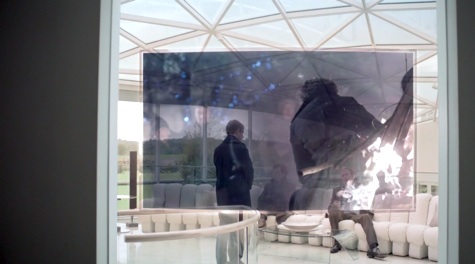
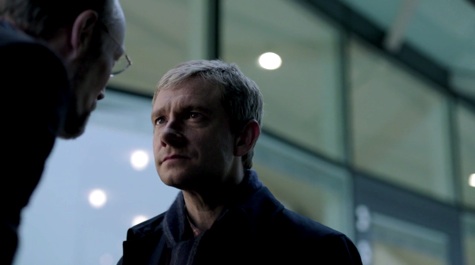
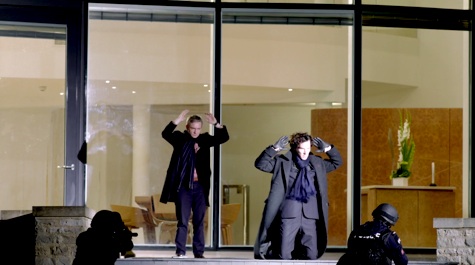
But there’s that ‘Sherlock straight up killed a dude’ problem, so Mycroft strikes a government deal and lands Sherlock a covert job in Eastern Europe—that will get him killed in six months. Better than life in prison and another smear job following his trial? Sherlock says his final goodbye to John Watson, but just as he’s away on a private jet to Certain DeathLandia, someone crops up on every screen in the United Kingdom.
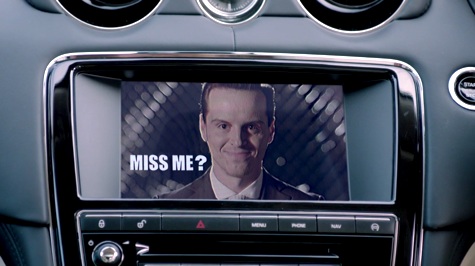
Oh hey there, handsome. We did miss you.
There was so much to wrap your brain around this episode, and some of the nonlinear intercuts didn’t play very well. Should you care? Well, if you’re an old school kind of Holmes fan, dissecting these things piece by piece is what you live for, so… no, you don’t care so much. I really didn’t. Though I found myself sort of glad that Magnusson was quickly dispatched because while he was a chilling villain, he was too odious to demand revisiting. Which fits in nicely with his canon counterpart who was also quickly dispatched. Because he’s a horrible person with zero redeeming anything.
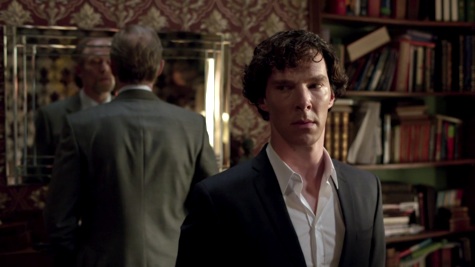
And what about Moriarty’s resurrection? Is he actually coming back? I confess, part of me really wanted him to stay dead because no one on TV ever does, and finding his peace in death was such a fascinating journey for a villain, but… oh, who am I kidding, I am so happy to see that crazy-eyed face again. If he really is back, that means that both of their faked suicides were really just another round of The Game he’s playing with Sherlock, and I cannot wait to find out what Round 3 is all about. (FYI, Moffat and Gatiss claim to have planned out the basic arcs for the next two seasons. Holding my breath for another two years starts now…)
Mary isn’t dead! Neither is tiny (YES, it’s a girl) Watson! And Mary’s an assassin who worked for the CIA, and that means that next season will be all about John and Sherlock running around solving crimes with the help of John’s amazing wife who can probably kill people with her thumbs. Good. One of the most fascinating aspects of this episode was watching how both John and Sherlock related to her; it perhaps shouldn’t be quite so shocking to realize (though it is) that Sherlock doesn’t just respect Mary—he genuinely seems to love her. Loves her because she’s clever and deadly and cares for John just as much as he does. Watching his face as John proceeds to tear into her is painful; he’s hurt to see both of them hurting each other.
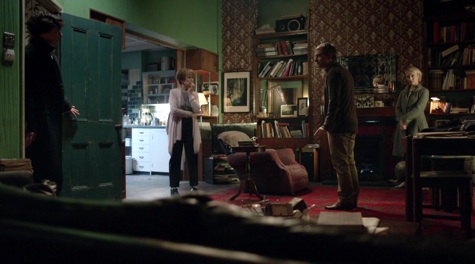

And John… I hold Martin Freeman solely responsible for all of my tears in this episode. The things that John says to Mary upon the reveal of her identity are mean and unfair, and that’s good because that’s how real human beings react to lies from the people they love. His emotions in this episode are just so damned real and raw. Poor John Watson needing it spelled out, really this time—needing to understand that he does attract a certain kind of person and to own up to the parts of himself that draw them in. (Do I need to point out that John seems to be having a resurgence of dreams related to his post-traumatic stress disorder because he hasn’t seen Sherlock in a month?) John learning to be okay with the sort of life he keeps eking out despite his everyman protests. Sherlock has already come to accept this, now it’s finally his turn.
This season has been a season about acknowledging family. About loving the people who matter to you despite their faults and shortcomings. What Sherlock seems to be saying to us now is: Look at this odd group of odd people. Look how well they complement one another. It doesn’t matter how strange they are because they can be strange together. And that goes for all of them, Molly and Lestrade and Mrs. Hudson and even Mycroft included. (And maybe Bill now, too? Nothing says “we love you” like a sprained arm from John Watson.) This is the reason why Magnusson must be put down—as Sherlock says “He attacks people who are different.” That lack of respect for difference makes him deplorable in every sense.
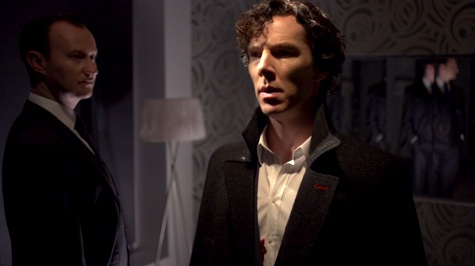
Of course, how they’re going to dismiss Sherlock’s murder charges on account of Moriarty’s return is… dubious at best, but I’m guessing that’s a handwave excuse in the making. Anything to get the consulting detective and criminal back in the ring together.
And now for the sundry—so much sundry:
-
Pegged pretty quickly that Sherlock was faking that affair with Janine because it was so very off of him, but also because it’s a canon nod to the Charles Augustus Milverton tale, where Holmes gets engaged to Milverton’s housemaid in order to glean more information on the man.
I would also like to point out that if Irene Adler and Jim Moriarty are correct, and Sherlock was indeed a virgin up until this point, he seems to have lost said virginity for a case. Which is exactly the only way I would have expected that to happen.It was mentioned in the comments that it seems as though Sherlock and Janine never did in fact have sex, due to her line “we could have, just once.” In which case, the hell is she doing hiding in his room dressed in his shirt? (Obviously planning on seducing him when he got back.) Was there lots of naked cuddling going on? He dragged her into the bathroom while he’s showering, so what—she’s just sitting on the toilet reading a magazine and watching him bathe? (I was with the repost of insults for Janine after she took a fair pop at him, until he tacked ‘whore’ on the end because, really? When writing a script, please just always delete that word. We need to be over it now.)
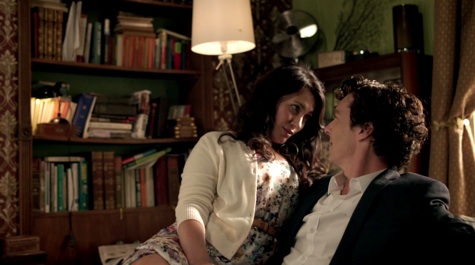
- How long have I been waiting for John Watson to just take someone apart with that medical flair. BAMF. It’s a sprain. Deal with it.
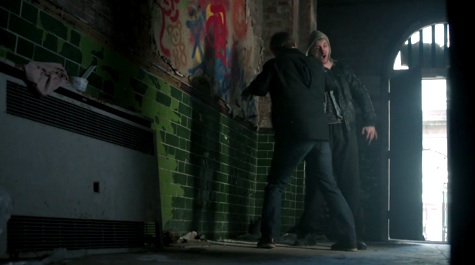
- Mrs. Hudson the exotic dancer (who smokes lots of weed). I need more information, I need to know how exotic—I NEED TO KNOW IF YOU WERE POLEDANCING, MRS. HUDSON.
- Slap him again, Molly! Just keep doing it until he finally says something not awful. Poor Tom; we knew it wouldn’t last. But at least she’s telling Sherlock exactly what an ass he is now. All his defensive sniping just made him look sadder next to her fury, and he likely knew it, too.
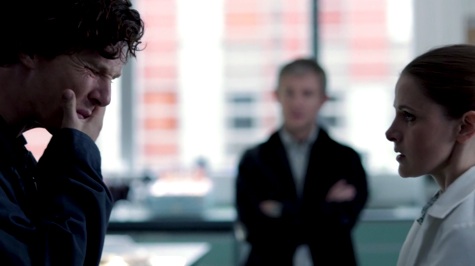
- Redbeard is a puppy! My fiancee called this one way ahead of time—she insisted that Redbeard had to be a pet that Sherlock lost in some tragic way, hence Mycroft bringing him up at the Watson’s wedding. But for that to be what Sherlock recalls when he needs to calm himself? *wince*
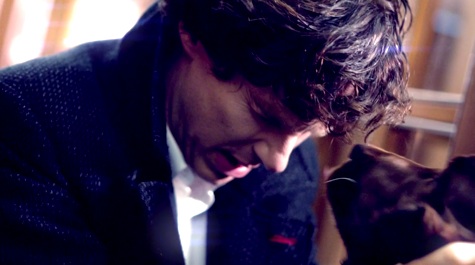
- So many canon references, too many to count, so I’ll give some highlights: reference to Mary being “The Empty House,” which is actually the story Sherlock came back to life in, Mary nearly killing Magnusson (in canon he’s killed by a woman he tries to blackmail), Bill Wiggins who is the head of the Baker Street Irregulars, Mary’s real name initials are a nod to “The Sign of Four,” and the place where Janine buys her cottage is meant to be Sherlock’s retirement home; in canon he retires to a cottage in Sussex Downs where he keeps bees. (Pity Janine’s getting rid of them.)
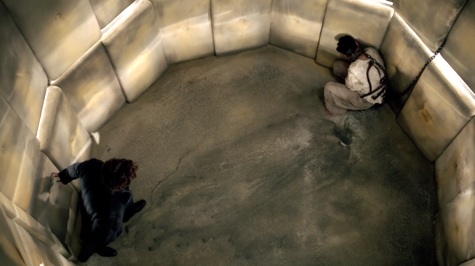
- All the people in Sherlock’s brain fulfill certain functions: Mycroft is the sharpest part of his mind yet again, Molly is the part keeping him alive (along with Anderson, interestingly), Moriarty is the straitjacketed bit that is tied heavily to pain and madness. But it is John again, always John who brings him back to life. Ugh, my heart.

- Mycroft finally admits that he’d be heartbroken if anything happened to his “stupid” little brother. Yeah, we always knew there was a (damaged) heart buried under there, you great big liar. Anyone who makes “caring is not an advantage” his motto must have something he’s terrified to lose.
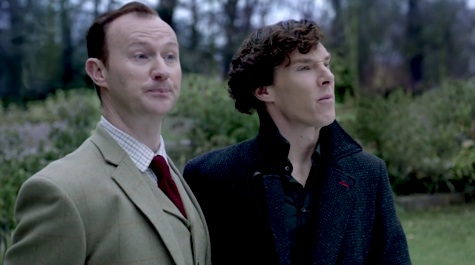
- THEY GET THEIR BRAINS FROM THEIR MOM. Their mathematician mom. This. Forever this.
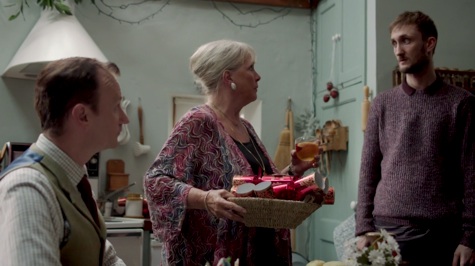
- What was with that weird after-credits clue? Anyone?
- Two things: Mycroft makes mention of “the other brother,” and how he may have done something awful to him. This is likely a nod to the fan theory that there must have been a third Holmes brother who would have inherited their family estate in the canon. The fans named this brother Sherringford, which was one of Doyle’s early potential names for Sherlock. In addition, Mycroft talks of a colleague who discussed using people as “blunt instruments,” which is a reference to M in Casino Royale right before he mentions that other brother. So… James Bond and Sherlock exist in the same universe? Then my favorite headcanon is coming true (I’ve been insisting on this since Skyfall came out), and I’m calling it now: Q is Sherringford Holmes. Tell me I’m wrong. I’ll fight you.
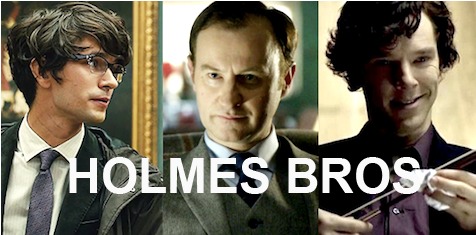
And that’s it for… probably another two years. I’m going to have a mental breakdown over that in a couple days, probably. Just you wait.
Emmet Asher-Perrin thinks this season was almost the death of her. She hopes that all the TV shows currently coming off of hiatus can give her a break from all these EMOTIONS. (She’s lying.) You can bug her on Twitter and read more of her work here and elsewhere.










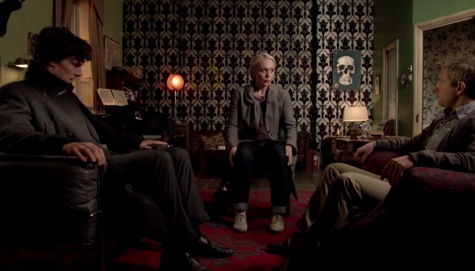
One of the things I really loved is that Mary lived… as did her marriage to John, no simple killing off, or divorce or something…
Sherlock is still a virgin. In the scene where she visits him at the hospital, Janine complains that he “could have at least *once*…” and he flatly says no.
Does Sherlock have a Head-John? He seems to have a Head-Everyone-Else but no Head-John. Which is why he needs Real John! If he had a Head-John he wouldn’t need a Head-Anyone. Except maybe Head-Redbeard.
Loved the James Bond reference — Mycroft refers to his counterpart believing they need “a blunt instrument” from time to time, a direct lift of M’s line to Bond in Casino Royale.
@Kesper – Ah-ha! Totally misread that. You are correct.
Remember, when Janine comes out of the bedroom, she says to Sherlock, “you’ll have to tell me where you were last night.” John thinks they had sex, but they didn’t.
Also, someone on Tumblr says that one of the writer’s names in the credits is changed to Beryl, which maybe a reference to the Beryl Cornet story, which may be the clue. Not sure about all that.
SPOILERS
Regarding the stinger… I know that depending on the region, a different post-credits bit was aired. To some audiences we saw the (intended) Jim Moriarty sitting down in a chair and simply asking “Miss me?” The other was an advert for the new BBC Musketeer series, with the audio from the same Moriarty clip playing over it.
Which understandably made for a strange 20 seconds of television.
@Alexander I. – Thank you! That makes way more sense than the Musketeer bit, which is what I saw. SO CONFUSING.
My flatmate thinks he has Moriarty all worked out:
Also, I’m sure I wasn’t the only person, who as soon as Magnusson revealed that he has no physical blackmail materials, was shouting “Just shoot him John! In the head, do it now!”
The third executive producer was listed as “Beryl Vertue” rather than the usual “Sue Vertue.” Sue Vertue being Moffat’s wife, and Beryl her mother, both of whom work producing television.
The whole show is seeming to be a bit of a family venture – the young version of Sherlock was played by one of Moffat and Sue Vertue’s sons.
Well, Watson’s wife did die — John tossed her old life into the fire (in the form of the jump drive), so her original self died. :)
—Keith R.A. DeCandido
I get very annoyed by this make-believe they have going on about sociopaths. Sherlock is not a sociopath and neither is Mary. Sociopaths are physically incapapable of caring about other people; their brains just don’t have the circuitry that allows it. We’re shown repeatedly that this isn’t the case both for Mary and for Sherlock.
@Drachasor – I know there’s a lot of irritation around the constant mislabelling of socio and psychopaths in the show, but I honestly think that’s intentional on the part of the characters; it’s a key in to just how damaged Sherlock is.
He knows that he is different from other people, i.e. his comment to Mycroft–“Do you ever think there’s something wrong with us?” and would prefer to have a label that he can use to explain himself away when he shocks others with his seeming lack of empathy. Rather than ever bother to get diagnosed (pity the poor psychologist who ever had Sherlock Holmes step into their office), he likely did a little research on his own and decides that he’s a sociopath. Because he thinks he doesn’t care about people (read: he’d rather not). It’s a self-defense mechanism. He calls himself a name before anyone else can.
In terms of Mary being a psychopath: it takes a very specific type of person to be okay with murdering lots of people in various dangerous situations. That doesn’t make her a psychopath at all, but again, it’s a shorthand. It’s a bad shorthand, but it does make more sense for the characters to just rattle off these terms incorrectly than to have deep knowledge of psychological diagnoses.
So, I’m 1. in the US and 2. don’t get BBC America, so I have to wait until PBS gets the series, and making do with spoiler reviews is pretty limiting, but I’m totally unclear on
1. why Mary would come out of retirement to show up at CAM’s place,
2. why she would shoot Sherlock instead of CAM,
3. and why Sherlock is ok with that.
Re: Sociopath/Psychopath — I agree Sherlock is neither. As for Mary — what is it John Cusack’s character says about himself in Grosse Point Blank (as to why he was recruited as an assassin) — that he has a certain “Moral Ambiguity…?” Mary Watson must have that too. Both seem very concerned for the safety of the people they love.
Edit: In thinking more on this, I’ve begun to think Mary is a psychopath. Psychopaths can mimic emotions, sometimes seeming to be better with people than people with a “normal” emotional range — but her concern in the episode is to “hold onto John whatever it takes.” Not concern for him, or his safety, or his needs. On re-watching, I think both Sherlock and John realize this…the Christmas “reconcilation” may be more — or less — than it seems.
I think you’re being a bit unfair on John. I don’t think he was mean to or unfair to Mary at all, his reaction was perfectly accurate and proportionate to discovering the woman you married has lied to you, deceived you and almost fatally shot your best friend. That Mary’s love for him is genuine allows John to forgive her, but it doesn’t oblige him to forgive her. Being attracted to that kind of person doesn’t justify that kind of person lying to you.
I didn’t see that scene as Sherlock trying to persuade John to forgive her, or as Sherlock being on Mary’s side, but that he was giving John the tools to be the one who made the decision. The only thing he was dissuading John from was making a kneejerk reaction without first learning all the facts. That Sherlock took John with him to hear Mary’s confession – especially given he’s tactically withheld information from John before – was a clear statement that he’s not playing games with John over this one, and of who’s side he’s on if it comes to that. I liked that a lot, because John’s put up with so much manipulative bullshit from Sherlock in the past that it’s nice to see Sherlock consciously choose *not* to do that in this case, and instead behave like a real friend.
And when John does forgive Mary, the scene comes later, without Sherlock’s presence at all, which makes it a stronger statement for John, because it really is his own decision and not just him doing what Sherlock wants. Though Mary should probably thank Sherlock for giving John so much practise at forgiving people.
@14 – as best I can answer:
1. why Mary would come out of retirement
Mary tried to eliminate CAM as he has already kidnapped John and left him to be burned alive, and sent a threatening “telegram” to be read to her at her wedding.
2. why she would shoot Sherlock instead of CAM
She had seconds, knew John was in the building and would be implicated in CAM’s murder if she killed him, as would Sherlock, and bought herself time by knocking him out. She shot Sherlock with surgical precision so as NOT to kill him at close range, and then called an ambulance as she escaped.
3. why Sherlock is ok with that.
Sherlock knows she could have killed him, didn’t, and he now knows that she will go to any lengths (and has the ability) to protect John.
In canon, Watson goes into a Limehouse opium den to find a friend called Whitney for his wife, and bumps into Holmes there. I remembered this as Holmes straight-up doing opium pipes out of boredom, but on checking, I see Holmes claims he’s “on a case” in the original story too.
But Sherlock does do a lot of morphine during this episode, even if it is legitimate medicine while he spends months recovering from being shot. btw, nice realism in shooting, both the lack of being blasted backward in the shot, and the slow, slow, healing after.
I really don’t like the sociopath line, and don’t think Sherlock is, but if he was one, and highly intelligent, then scrupulously-built simulations of people would be just what he would need, and the Memory Palace a reasonable place to house them.
I am disappointed that the Holmes’s mum was not credited with writing “Dynamics Of An Asteroid” in this world.
A.G.R.A, as well as being a reference to “The Sign of Four”, also has Amanda Abbington’s initials at beginning and end.
Agra is also where the Taj Mahal is, a monument to both love and death – very appropriate for Mary and John’s rather dark relationship.
@Emmet Asher-Perrin
Yes, I know they are damaged people. I think tossing a “sociopath” label on it is a disservice to that and it also has the negative effect of misinforming people on what actual sociopaths are like. It also acts like Mary and Holmes are very similar, when I suspect they have some very big differences in their psychological makeup. Watson, being a doctor, should know enough to call BS on the “sociopath” crap rather than joining in with it. Like you said its a bad short-hand and I think that detracts a bit from the show — but the show still manages to be really good.
I think it is a bit of a shame that Watson never looked at Mary’s history (assuming he wasn’t lying) and we didn’t really get a good look at it. Mary’s psychological problems seem potentially larger than Sherlock’s — she’s only been shown to care about Watson, period. She values Holmes, it seems, because he’s good for Watson.
Also, I always find stories where someone basically says “I can’t handle your past, so I’ll pretend it doesn’t exist” is used as a powerful romantic statement. Especially when that past clearly haunts that person. Can Mary really sleep well at night knowing that some figure from her past could shove it in Watson’s face in the future? And in a very real way Watson didn’t choose HER, he chose his somewhat damaged image of her where he ignores her past. It seems so often with stuff like this we don’t see the person in Watson’s position learn about the history, accept it, and then help their significant other deal with any demons or other fallout from it. It bothers me a bit.
That said, I thought the episode was great overall.
“I am disappointed that the Holmes’s mum was not credited with writing “Dynamics Of An Asteroid” in this world.”
HANG ON.
Canon Moriarty=mathematician.
Holmes’s mum=mathematician
Holmes’s mum=Moriarty!
(Give me another three minutes and I’ll be able to explain reasonably lucidly how that ACTUALLY MAKES SENSE.)
“In canon, Watson goes into a Limehouse opium den to find a friend called Whitney for his wife, and bumps into Holmes there. I remembered this as Holmes straight-up doing opium pipes out of boredom, but on checking, I see Holmes claims he’s “on a case” in the original story too. ”
Actually, in the original story (The Man With The Twisted Lip) it was a lot more obvious that it was connected to a case (a businessman had disappeared in the opium den). Here I think Sherlock was actually shooting up, though I suppose the real reason was in order to give Magnussen a “pressure point” (I guess the crack is a side benefit).
@17, thanks. Although “surgical precision” is laughable. Even with expert aim, there is enough variation in human anatomy, plus random tumbling of the bullet in tissue, so that you can never be sure of not hitting an artery that bleeds out the target in 30 seconds. At best, it was a helluva risk. But overall, thanks.
Did anyone else wonder if there might not be a connection between Moriarty and Janine? I’m wondering if he isn’t really dead, but has someone else (his sister?) continuing his work.
@23 – Strong Dreams – For all the improbability, the scene gives nods to Sherlock’s doing all he can…in 6 seconds, if I recall – to give himself the best chance of survival. It’s a remarkable bit of television and builds on all the writers have set up in previous episodes. I hope you enjoy when you get a chance to watch!
As far as John learning Mary’s history goes – he probably does need to learn it. But reading that drive was not the right way to learn it.
What he did was leave the door open for Mary to share her history with him, when and how she is comfortable. He knows the basics – that she was a spy and an assasin. And he knows what that means, emotionally, to be a person who lives with daily violence, and who has killed.
If he’s learned about her past from reading the drive, it would have been learning the facts, but not her feelings about it.
And I suspect that John is also needing someone whom he can confide in, not as a therapist, but as an equal – someone who has been there.
The process of the two of them sharing the darker sides of their past together is going to be important to them.
For one thing, in telling John about her past herself, Mary would be undoing the lies she told him. That shift to a truthful relationship would not be happening if John merely read about Mary’s past. And I think that John does hope that Mary will make right the lies and tell him the truth of herself. He made it clear that he was still angry (and justifiably so) about the lies. What he needs is not a list of facts, but for Mary to tell him the truth.
“I NEED TO KNOW IF YOU WERE POLEDANCING, MRS. HUDSON”
Google Image “Una Stubbs dancing”. No poles as far as I know, but there may be legwarmers.
Mrs. Hudson, dancing.
http://www.youtube.com/watch?v=ZmyiDes-ICw
@26, Ursula
I think there are multiple ways to begin a conversation (ideally before shooting your husband’s best friend, but oh well). Sometimes it is easier to share hard facts, as Mary chose to do, and then talk about it after. Watson is certainly wise enough to know that hard facts are going to leave a lot of elements out, and that it would only be a first step towards talking about things. Remember Mary did provide the files to Watson, so they are coming from her.
That said, deciding to talk about things instead of reading the files is another option that’s good.
Watson didn’t choose either of those, however. He pretty clearly wanted to pretend her past didn’t exist. Which is a shame.
I think too much is being made of Moriarty and Janine being Irish; sometimes a cigar is just a cigar (I’ve over-interpreted details in media discussions here myself recently, at least twice)
Doyle had Irish family, and the sidekick/viewpoint character in The Lost World, Edward Malone—Watson to Professor Challenger’s Holmes—was Irish. Moffat and Gatiss may be alluding to that, or it may just be that that’s the makeup of London, or even the makeup of the pool of actors around the BBC.
@24 That’s the second time I hear someone suggesting something like that but what do you have in mind?
I don’t really think Moriarty is really back. There’s the fox pin referring to a Grimm story in last episode of series 2 and his ringtone Stayin Alive has been confired to be just a great coincidence and not actually a foreshadowing. I think it could simply be someone else using his image. Maybe Sebastian Moran? Though I doubt it. When I saw Mary wasn’t who she said she was I thought she was a female version of Moran (she is a great shooter) but then I saw the initials so I discarded that theory. So far they’ve sticked to the canon, so Moriarty shoud be dead but since the order of eents have been altered (Watson marrying until now) maybe it could be something related with The Valley of Fear… but still I’d prefer Moriarty to be dead.
@30 What are people making of Moriaty and Janine being Irish? I am Irish living in England and can’t say I noticed (well, I noticed but didn’t attach importance to it). There’s a ton of Irish actors working in the UK, and a ton of Irish people living here too. It is entirely common to hear Irish accents on the TV and on the streets of London. I’d say they just happen to be two actors the showrunners liked.
If Moriarty is alive, that diminishes Holmes, who would have analyzed all the contingencies and made darn sure he was really dead before doing his own swan dive.
But maybe Moriarty has a smarter brother (or sister)…
What a wonderful review/recap! Thank you :D:D:D:D
Moriaty is an Irish name, so it makes some sense to cast the character as Irish. I don’t see any reason to connect that with Janine (an unrelated character) also being Irish. As above, there’s lots of Irish actors in the UK, the powers that be probably just liked her.
I really hope Moriarty isn’t alive. In fact, I cannot believe he is. So I’m going to assume this is some kind of trick and that Moffat and Gatiss just want to freak us out for the next year or two while we wait for the next season.
That said, if Moriarty were alive, it would only be right if the scenario that saved him was the one where he and Sherlock giggled on the roof about the stunt they were pulling.
I loved this episode and this season and can’t wait for the next.
did anyone else think CAM’s voice in his last scene (right before he was shot)sounded a lot like bane from the dark knight rises?
1. I think if Janine and Jim were brother and sister Sherlock would have figured it out.
2. Has anyone else considered the possibility that Jim’s resurrection could be something one or both of the Holmes Brothers is faking in order to keep Sherlock from going on the suicide mission?
RE the whore thing, I absolutely agree in general but he said ‘media whore’, which is a thing in itself, is genderless, and doesn’t mean, y’know, actual whore.
@PeterMoriarty:
Yes, I think the plot arc for season 4 is going to be the revelation that Moriarty’s “return” is a failsafe plot by Mycroft.
As for the third Holmes brother: while Mycroft mentions “the other one”, the conversation is also in the context of Mycroft having zero brotherly affection in regards to a suicide mission, suggesting the third Holmes brother is dead, and with Mycroft’s connivance. So there’s not much chance that Q is Sherringford, if not Mark Gatiss simply being a straight-up troll to the fanfic community.
@38 – PeterMoriarty – I think it’s almost certainly some kind of fake out. I wouldn’t put it past the Holmes boys, but it seems like there would be unavoidable consequences if/when the truth came out. As there were almost consequences in this episode. You can’t keep stacking up consequences, so I think it has to be someone else – probably someone associated with Moriarty. (I also doubt this is Janine.)
I’ve been working on a theory that Mycroft and Sherlock work much more closely than we’ve ever seen – right from the “arch-enemy” dialog in the first episode. They want the world (and John) to see them at odds. I think the fight in Baker Street was staged for John’s benefit – as was Mycroft’s declaration that if Sherlock went after Magneson he went against him (Mycroft.) (OTOH, maybe this is obvious to everyone already.)
Edit to add: I keep foregetting to add, another lovely review, Emmet Asher-Perrin!
Thanks so much for your spot-on review, Emily. You describe exactly what I felt after seeing His Last Vow. I think it was Sherlock’s idea to trick Mary into confessing she’d do anything to protect John from the truth with John overhearing. Tough love towards the both of them. We’re shown just what a wonderful human being and what a loyal friend Sherlock is.
Re Professor Holmes’s The Mathematics of Combustion (typo on the cover):
She knows ash. Don’t tell me she doesn’t.
Moffat knows how to craft a story, there’s no disputing that. But am I the only one disappointed in Magnussen? For an arc villain, he falls flat. His threat to print secrets about someone in his newspaper with no evidence to back it up is, for lack of a better word, stupid. Publish a story about someone’s love letters to an underage girl? Present them, or prepare to be sued for libel.
For a man of such intelligence, Magnussen was incredibly short-sighted to have no contingencies in place if he died, no protection, and no weapons. Contingencies might seem like a play from Moriarty’s book, but he needn’t have had the monopoly on them.
As for:
What was with that weird after-credits clue? Anyone?
I think it was BBC’s stupid SFX at the end of the credits of Moriarty’s thing he said when he was on all of the TVs. Nothing big unfortunately.
typo “Look how well they compliment one another.” / complement/
People seem to love this show, and I used to, but I’m getting more and more uneasy as it veers away from logical plotting to fan service. Sherlock Holmes was not a Marvel superhero. He was a crime fighter. Dabbled in espionage for the crown. Bringing back Moriarty after we saw in closeup a bullet through his brain is so disappointing. He’s become “The Master”. Foiled again! Dead again! But I’ll be back!
In “Lost Vow” Magnusson was just a joke as a villain. His “leverage” was stuff he knew about people, many dangerous and powerful people, and one of them would have done what Mary did long ago and just killed him. People he taunted like Watson could have just lost it and killed him, and probably have got off with a reduced sentence for provocation if they were brought to book. Mycroft certainly would have had him killed the moment he started blackmailing members of the government. Magnusson not having the actual documents wasn’t a protection, it was idiotic. Spreading, or worse, printing in his newspapers, scurrilous stories without hard proof would just get him sued into bankruptcy. English libel laws are pretty strong at protecting the rich and powerful. Anyway, a killer would just have planned to firebomb the archive after killing Magnusson. But the whole concept of there being no physical archive makes no sense. Where did all the information come from? Obviously Magnusson couldn’t collect it personally, he must have a large organisation of investigators, hackers, etc to collect it and they all must keep records. They can’t all be Vulcans who store information in mind palaces and exchange it my mind melding. And all Magnusson’s bodyguards — none of them noticed the gun in Watson’s coat pocket? No patdown, no metal detector? Complete bollocks.
What should have happened was that Watson, when he knew that there were no records, and Magnusson started flicking his face, would use his surgical king fu, already demonstrated, and killed him with his bare hands, to protect the two people he loved the most. Or maybe just slip a drug into his drink, to cause a convenient amnesia, if you wanted to leave him guilt free.
But it had to be Sherlock, because he’s the protagonist.
American here so I have to wait to see the full episode. I have a question I would like to pose. Has anyone considered that Rich Brooks was telling the truth in the reporters flat? He was an actor hired to play JM. He simply wasn’t hired by Sherlock, but in reality was hired by JM posing as Sherlock? If JM is such an intelligent criminal, why create and live the daily life of an actor or live as an actor and create a secret identity as a consulting criminal when it would be much safer to simply pin his identity to an existing person who ends up dead? If Brook really is JM, why run from Holmes and Watson when discovered at the reporters office? JM has no problem having someone killed, so he wouldn’t be too worried about the reporter finding out the truth.
My my theory is that JM hired Richard Brook under the premise of playing a role in a sort of reality show. Hired may be too broad of a word though, forced, coerced, blackmailed may be more appropriate. He, Moriarty, then had him film some spots for advertising and is now playing them after his death to announce to Sherlock that he duped him and that the game is still on.
Im also toying with with the idea, much as the American adaptation Elementary does, that Irene Adler may actually be Moriarty. This could explain all the IOU’s seen in Reicenbach Falls. She owes him for saving her life, for possibly foiling a plan of hers unwittingly, or even for something we don’t know about yet.
Perhaps Mycroft, knowing that he was sending his brother to his death via a suicide mission in Eastern Europe, faked Moriarty’s image so that he would have an excuse to summon Sherlock back to England, thereby saving Sherlock’s life.
And what was the full story about Janine and her boss, Magnusson? Was she secretly working for someone (Mycroft, Moriarty)? After all, who would willingly work for Magnusson the Sociopath? Only someone seeking information, power, or control. Magnusson, in the scene where he was (disgustingly) “flicking” John’s face, implied that he had done the same to Janine and that she had made odd noises. Was Magnusson abusing her simply because he could (possible) or for some specific reason?
Any why was she unconscious when Sherlock and John arrived in Magnusson’s office? Had Mary knocked her out? or Magnusson?
In the hospital scene, Janine said that she was going to appear on “The One Show” and needed time to make up her story for it. That implies that the newspaper articles about “Shag-a-lot Holmes” were also fictional and that, as others have speculated, theirs was not truly a sexual relationship.
Janine was Mary’s best maid in the wedding. Was Janine, like Mary, an assassin? There is more than we know to Janine. We will see her again. I personally am glad because I think she is great fun. Whatever else she is, she is someone who “gets” Sherlock.
I have a hard time believing that CAM’s vast network of blackmail was all in his mind palace. First, because as others have pointed out, the suggestion of blackmail isn’t all that useful, but moreso because there’s a limit to what can be remembered. Early in the show, Sherlock tells us that he devotes all of his memory to his mind palace, eschewing banal knowledge to maximize its capacity. Assuming that Sherlock’s limitation isn’t unique to him, it seems to be a safe bet that at some point, CAM would run out of room and have to forego some potentially valuable piece of information, which would seem to defeat the purpose of blackmail.
Thinking more about it, it becomes much sadder that Sherlock messed things up with Janine so badly.
Going back to the wedding, Sherlock and Janine were dancing, a waltz, in a quiet side room. Janine asks why they are dancing there.
And the answer Sherlock gives is very Sherlock – her dancing isn’t up to his standards, they will have to dance together in public, so they are practicing.
And Janine’s response is utterly astonishing. Rather than being offended that he insulted her dance skills, she responds with a complement. And not just any complement, she complements Sherlock for an interpersonal skill.
Sherlock, as it turns out, is good at teaching dancing.
Janine is not offended, because Sherlock’s style of preferred dancing is not the dancing of a modern wedding’s dance floor. He likes the waltz, and his pirouette suggests training in formal dance. Janine, a contemporary woman, hasn’t really learned to waltz, and she hadn’t thought about learning it, but she’s finding it interesting to learn from a good tutor.
And Sherlock, in return, offers a glimpse of the truth of himself to her. Why are they there, in that side room, dancing? Because he secretly loves to dance. And he loves this type of dance – just the participants, formal, no crowds, purely about movement and practice and coordnation with one’s partner. Not the spontanious and casual dancing on a crowded dance floor we see later. The pirouette is part of the truth.
Janine is even accepting of Sherlock’s odd sexuality. She sounds him out about a casual encounter, but reacts to his flustered reluctance with kindness and a joke to lighten the mood. She remains friendly with him despite his unspoken, though very clear, “no.”
Later we see that she develops a relationship with him despite his continued physical distance.
If it weren’t for Sherlock’s idea of faking a romantic relationship with her to get at her employer, there was a great opportunity for him to explore a new form of friendship. Friendship with a woman whom he isn’t interested in dating, and who recognizes that the idea of sex and romantic intimacy is not something he’s in a position to enjoy, but who enjoys learning dancing from him, and who, in turn, lets him practice sharing ideas and skills in a recreational (rather than professional) setting.
Sherlock enjoys his quiet dance with Janine in the side-room. (He doesn’t leave the wedding without dancing!) She enjoys learning his type of dance. He respects her need for conventional romantic and sexual relationships, and helps her find a good man to go home with. She appriciates his skills at both formal dancing and sorting out a good casual sexual encounter.
Sherlock enjoys his dancing with Janine, both the supposed practice in private, and hopefully the necessary dance in public. He helps her find someone suitable for the rest of the evening. And he leaves when the dancing has shifted to a sort that isn’t his preferred style.
Imagine what Sherlock and Janine’s friendship, if he hadn’t decided to use her to get at CAM. She’s interested in learning formal dancing. He enjoys both the practice of formal dancing and teaching it to her. She respects that he isn’t interested in a sexual relationship. He respects that she is interested in sexual relationships, and puts his deductive skills to work in helping his friend find suitable men to get to know.
It could have been brilliant. Sherlock and Janine as an odd sort of friends, friends with no interest or need or tension about romantic potential.
Letting that relationship develop would probably have taken the program in a direction that might not have been good, from a story standpoint, in the long-term. (Too far from the source material on Sherlock Holmes.) But part of me would love to have seen Sherlock develop a friendship with a woman that matches his social needs in a way that complements how John meets other needs in his life.
Jim Moriarty is dead. Miss me was from one of his two identical brothers. So yes, triplets.
Just as the glowing bunny case was a clue to the actual case in Season two, so was the “solved it without ever leaving the flat” case.
In episode 2, John was trying to get Sherlock away from the flat and the wedding planning by finding him a case. “My husband is three people, says he has three distinct patterns of moles on his skin.”
The guy who was three people, with different moles? Sherlock deduces identical Triplets, case solved.
Also … Obsure clue to the arrival of our next Moriarty is delivered.
Re the sundry points… he doesn’t call Janine a whore, he calls her a tabloid whore, which is basically just another way of calling her a media whore. Still not exactly a compliment, but not nearly as bad as plain “whore” would be.
A couple of tidbits might enhance one’s viewing experience when next watching this series of Sherlock. Sherlock’s parents are portrayed by Wanda Ventham and Timothy Carlton, Benedict Cumberbatch’s actual parents. Mary Watson is played by Amanda Abbington, Martin Freeman’s partner since 2000; they have two children together.
I liked this episode and I’m looking forward to the next season. It’s going to take forever get here, make them shoot it sooner. They’ve got to be done shooting the Hobbit by now, right. My favorite scenes are the Xmas ones with the parents and Mycroft especially when Sherlock knocks them all out to go and confront Magnusson. I know Moriarty has to be dead and something else is going on I can’t wait to find out what happens next time. I really hope they don’t kill off Mary and baby Watson.
This was by far my favorite episode, simply due to the mishmash of emotions it caused. So much upheaval, so much revelation… So much shock and awe…. Thats what it is, really, a shock-and-awe campaign to tie us all to these people irrevocably. We are all Sherlocked…. We cant help it. These characters have REAL reactions to unimaginable situations, and to explain oneself as a high functioning sociopath is a character writing himself as he goes. Nothing is beyond Sherlock Holmes, because he is an empty slate, his psyche written in every interaction with the people he is only now realizing he cares for…. It has taken a meanigful relationship with Watson to open the small part of his heart that CAN love, and like the Grinch we’ve seen his heart grow three sizes. Its hope that Sherlock brings to all the broken, all the empty un-whole people in the world. You CAN learn to love, he is proof. And if love means blowing someone’s brains out…. Well, you can give the man points for permanance!
When he learned that Mary was some sort of sneaky assassin, Watson was angry, and to be honest, so was I. Because I just felt that, once again, Mr. Moffat had turned a female into a plot device, not a character. I loved the wedding episode, and seeing that Mary was clever and brave, and accepting of the bond between Watson and Holmes. I did not need her to become a ninja assassin to find her character interesting and compelling. Sometimes Mr. Moffat tries to be too clever by half, and his plots get more than a bit too tricksey.
But in the end, like Watson, I decided to accept Mary as she is (and to accept Mr. Moffat’s show running as it is, for that matter), and to look forward to the future of this sometimes frustrating, but always compelling, version of Sherlock Holmes.
The episode was the least of this season; which is still better than most shows. This is what happens when you look in a mirror and say, “Mind Palace!” three times.
I saw my first indication ever that Sherlock’s self assessment may be right – he may actually have an antisocial personality disorder. Look for the logical fallacy that he presents when John and Mary are arguing in his flat. Until then, I was with the team that said, yeah, Sherlock’s full of crap.
I don’t think much of Magnusson. He’s a broad, arch movie villain. But I thought even less of Milverton, so I got a little more than I was expecting.
I liked the opening setup with John going out to the heroin den. I wondered later on if Mary already had a gun in her jumper and a knife in her boot, in case John ran into trouble.
At the moment at which sherlock realizes that CAM is not wearing computer glasses, he knows that CAM has a mind palace, and thus that the only way to destroy “the vault” is to put a bullet through it. For one of any number of reasons, mycroft cannot be seen as being responsible for doing it (political, perhaps). One gets the distinct impression that, when Mycroft calls to Sherlock and John “get away from that man”, it was not to protect CAM but rather because the commandos were about to shoot CAM. Sherlock planned to shoot him all along, making sure john had his gun. By the way, Mycroft leaves. The laptop that protects Britain lying around, getting covered with food? Methinks not. The whole shooting scene was a set up, as, I think, along with many of you, was the GIF appearance of JM, which provides an excuse to return Sherlock to Britain. Nothing here is what it seems.
Any thoughts on Moriarty being the third brother?
How did Mary get in and out of CAM’s flat??
But here’s the question I need answered. How is it that a series so dedicated to staying true to the character of Sherlock Holmes would have him murder someone.
1. Has Sherlock every committed murder?
2. If not, how could the writers justify such a serious character divergence by allowing him to commit murder here?
3. If he did not murder CAM, then what happened?
@63 – there is some thought that Sherlock may have murdered CAM in the original story – which, like many of the original stories, was written as though it was an account of their adventure as taken down by Dr. Watson, and sent to his magazine.
So it depends on how reliable you think his narration. They did conceal running from the scene and the identity of the murderer.
Sherlock did surely threaten murder when Watson was shot in one story, although, as Watson survived, he didn’t need to carry it out. I seem to recall him carrying a gun from time to time, too.
Moriarty is the 3rd Holmes brother. Gah! They all reference the East Wind.
Molly and Anderson are the people keeping him alive in his mind palace because they are the ones who believed in him.
What if Sherringford is Sherlock’s TWIN brother? What if the final twist is that Sherlock did NOT fake his suicide – he actually died, and his twin brother Sherringford took his place? (Or it was the twin that died.) That would explain why we have so many versions of how he faked his death – none are true. One of the twins really died. That’s what Microft means by what happened to the “other brother.”
I am seriously wondering if we watched the same show.
this review is absolutely ridiculous.